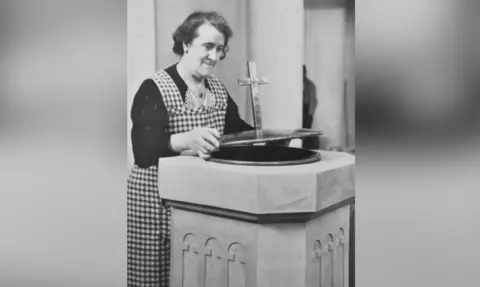 Eddie Wulff
Eddie WulffHidden away in a church in Hamburg is a plaque dedicated to a relatively unknown Welsh woman, outlining astonishing acts of bravery.
Mabel Wulff from Newport lived in Nazi Germany – surviving years of Gestapo harassment and bravely fighting fires caused by falling bombs.
The plaque says the St Thomas à Becket Anglican Church, known as simply “the English church” for many years, would have been destroyed without her – after she hid its artwork to save it from damage, smothered fires as they started.
She also sheltered people to save their lives.
“She’s a part of history – Newport history and Hamburg history,” says Eddie Wulff, Mabel’s grandson who has spent the past few years trying to learn more about his grandmother’s life.
“But very few in Wales seem to know about it. She was formidable.”
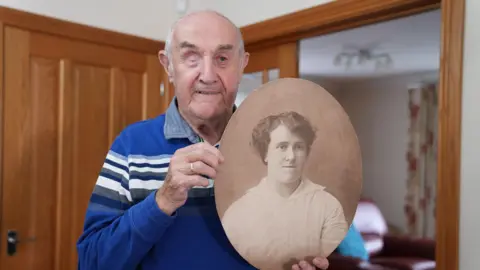
It is a story that begins in Newport in 1909 when seamstress Mabel Phillips married Max Wulff, a German sailor.
They couldn’t have imagined the difficulties ahead, with Max setting up a restaurant on Alexandra Road in the Pill area of the city and the couple welcoming two sons in 1911 and 1913.
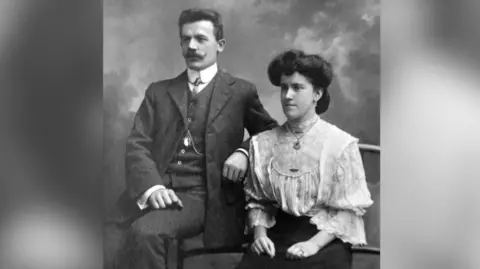 Eddie Wulff
Eddie WulffBut the family were separated, with Max seen as an enemy of the state by the British government and sent to prisoner of war camps in Lancaster and on the Isle of Man.
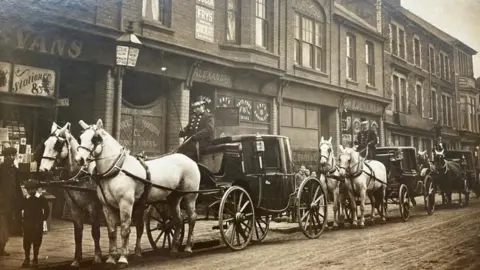 Eddie Wulff
Eddie WulffLife for Mabel and her sons Edward and Leonard became difficult, says Eddie.
“There was a lot of anti German feeling in Newport. They asked Mabel whether she would divorce Max because he was a German – she refused to do that.”
It was a feeling Eddie himself remembers, being in school in Newport at the end of the 1940s, where he recalled being called “Nazi” and “Gestapo”.
“They must have had it even worse” he said.
Sent back to Germany
As soon as the war ended, Max wasn’t allowed to return to Newport but sent back to Germany, where his young family would soon join him.
“They had so much hassle – every stage of their life had been hard,” Eddie said.
That became apparent again in 1930s Hamburg. By then Mabel was the caretaker of “the English church”, a Church of England church originally established because of the trade links between the city and the UK.
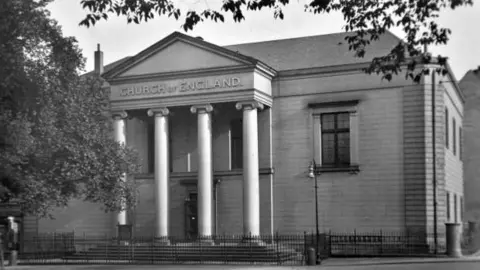 Eddie Wulff
Eddie WulffOnce war broke out, an Anglican church with a British caretaker attracted numerous visits from the Gestapo.
“She said they really were nasty and they were strutting about. They were always looking for the Union flag and the British Legion flag which Mabel had hidden under the altar,” Max said.
“They were bouncing about, asking where these things were – they were actually walking on top of them.”
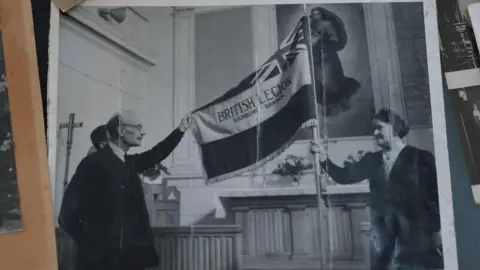 Eddie Wulff
Eddie WulffAs a key port city, Hamburg was targeted by sustained bombing raids, most notably during Operation Gomorrah in 1943.
In anticipation of this, Mabel hid and stored some of the beautiful paintings and engravings from the church, meaning they were saved from damage.
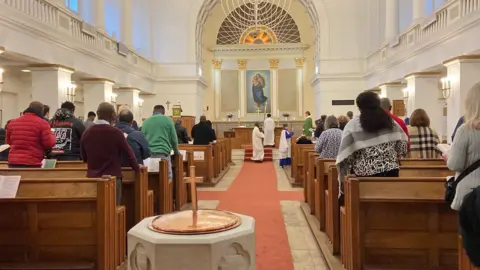 Madeleine Resühr
Madeleine ResührIt seemed there was nothing she wouldn’t do to protect the building during the raids, putting her life at risk.
“She did put fires out, she went around and smothered them and got water and put them out on numerous occasions. She did save the church,” said Eddie.
 Madeleine Resühr
Madeleine ResührMabel Wulff also let families, displaced by the bombings, shelter in the church – again drawing the attention of the Gestapo.
“She was a good person. You didn’t mess with Mabel – she was formidable,” Eddie recalls.
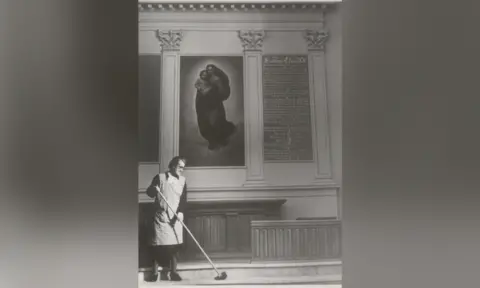
At the end of the war, Mabel brought out the union flag she had hidden under the altar and draped it over the church’s balcony as British Troops entered the city.
Mabel’s bravery was noted by Church of England officials in 1947, thanking her for the “great personal danger” she put herself in.
In 1956 she was awards a British Empire Medal for her actions.
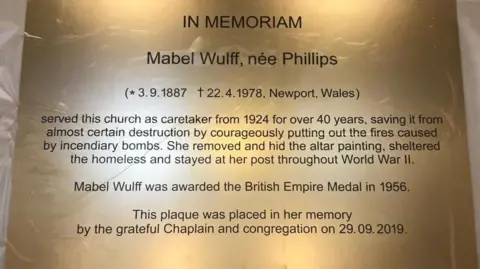 Madeleine Resühr
Madeleine ResührEven though Mabel returned to Newport in her later years and lived with Eddie and his family when he was a child, much of her story was unknown until relatively recently.
“You would have to drag it out of her. I am very proud of her. Most of it passed me by most of my life. I am in my 80s now and I’m just realising how important my grandmother was.”

